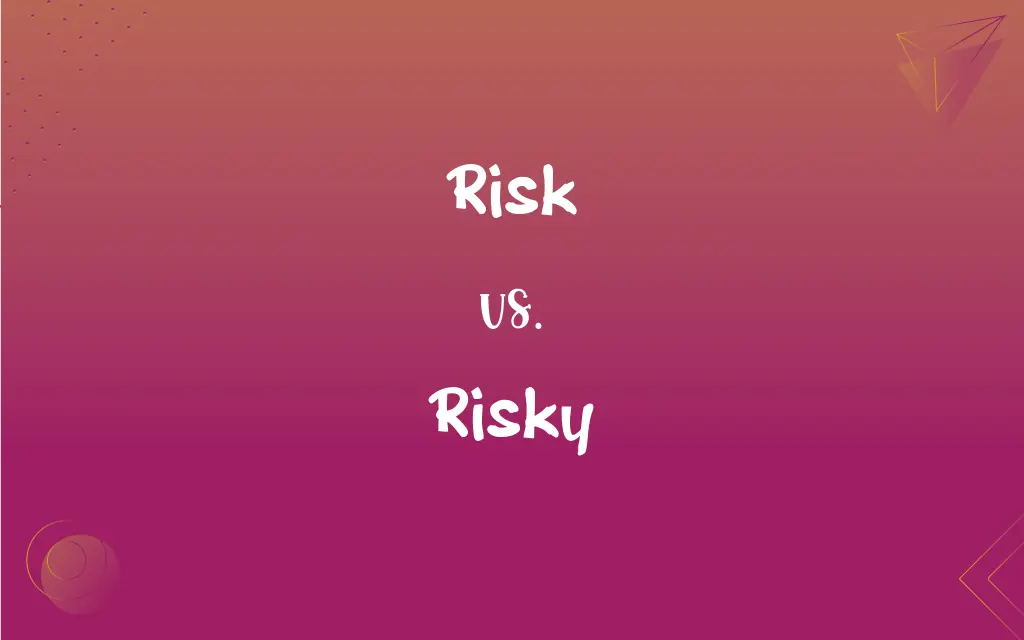Risk vs. Risky: What's the Difference?
Edited by Janet White || By Harlon Moss || Published on March 4, 2024
Risk is the potential for loss or harm; risky describes situations or actions with a high probability of causing loss or harm.

Key Differences
Risk refers to the potential or possibility of encountering loss, harm, or other adverse effects. It is a noun describing a concept or condition. Risky, however, is an adjective used to describe actions, decisions, or situations that have a high likelihood of leading to harm or loss.
In financial contexts, risk might refer to the potential for financial loss in investments. Risky is used to describe investments that are likely to result in a loss. In health, risk could mean the chance of developing a disease, while risky would describe behaviors that increase the chance of disease.
Risk assessment involves evaluating the potential for negative outcomes in various scenarios. Describing something as risky is an outcome of risk assessment, indicating a high likelihood of danger or loss.
Risk management is a strategic approach to minimizing potential losses, while recognizing something as risky is often the first step in risk management. Perception of risk can vary, but labeling something as risky is a more definitive statement about its nature.
Risk is often quantified or discussed in probabilities, while risky is used qualitatively to express the nature of a situation or action. Risk implies a neutral condition of possibility, whereas risky implies a negative connotation towards the action or situation.
ADVERTISEMENT
Comparison Chart
Part of Speech
Noun
Adjective
Usage
Describes potential for harm or loss
Describes actions or situations likely to cause harm
Context
Used in discussing possibilities and probabilities
Used to characterize the nature of a decision or action
In Relation to Decision-Making
The factor to be considered or evaluated
Describes the nature of the decision or action taken
Perception and Management
Can be quantified, managed
Qualitative, indicates the need for caution
ADVERTISEMENT
Risk and Risky Definitions
Risk
A factor in decision-making involving uncertainty.
Smoking poses a significant health risk.
Risky
Pertaining to situations with high uncertainty and danger.
A risky business venture may not always pay off.
Risk
A quantifiable probability in various scenarios.
There's a high risk of rain tomorrow.
Risky
Characterizing decisions with potential adverse outcomes.
Investing all your savings in one stock is risky.
Risk
The potential negative outcome in a situation.
Starting a business involves considerable risk.
Risky
Involving a high probability of danger or loss.
Skydiving is considered a risky activity.
Risk
A concept in assessing dangers or hazards.
There's a risk of injury in extreme sports.
Risky
Describes actions likely to lead to harm.
Texting while driving is a risky behavior.
Risk
The possibility of loss or harm.
Investing in stocks carries a risk of financial loss.
Risky
Indicates a quality of danger in a choice or action.
Climbing without proper equipment is risky.
Risk
The possibility of suffering harm or loss; danger.
Risky
Accompanied by or involving risk or danger; hazardous.
Risk
A factor, thing, element, or course involving uncertain danger; a hazard
"the usual risks of the desert.
FAQs
How is risk used in finance?
As a term to describe the potential for financial loss in investments.
Can risk be positive?
While usually associated with negative outcomes, risk can sometimes lead to positive results.
What is risk?
Risk is the potential for experiencing loss or harm.
What makes an activity risky?
High likelihood of danger or adverse outcomes makes an activity risky.
How do businesses manage risk?
Through strategies aimed at minimizing potential losses.
What does risky mean?
Risky describes situations or actions with a high probability of danger.
What's an example of a risky decision?
Gambling large sums of money is a risky decision.
Is risky always negative?
Yes, risky typically implies a negative connotation towards danger or loss.
Can a person be described as risky?
Yes, if their actions consistently involve high risk.
Are risk and risky interchangeable?
No, they serve different grammatical purposes and convey different meanings.
How can risk be assessed?
Through evaluating the probability and impact of potential adverse events.
Does risky always involve physical danger?
No, it can also apply to financial, emotional, or other types of risks.
Can risk be eliminated?
Not entirely, but it can be reduced or managed.
What are risky investments?
Investments with a high chance of loss, often with potential for high returns.
How do people perceive risk?
Perception varies based on individual experiences and knowledge.
Why is it important to identify risky situations?
To take precautions and make informed decisions.
How does insurance relate to risk?
Insurance is a tool to mitigate financial risks.
Is it possible to take a calculated risk?
Yes, where the potential benefits are weighed against the potential losses.
What is a risk factor?
A condition or element that increases the likelihood of a negative outcome.
Is driving at night risky?
Yes, due to reduced visibility and higher accident rates.
About Author
Written by
Harlon MossHarlon is a seasoned quality moderator and accomplished content writer for Difference Wiki. An alumnus of the prestigious University of California, he earned his degree in Computer Science. Leveraging his academic background, Harlon brings a meticulous and informed perspective to his work, ensuring content accuracy and excellence.
Edited by
Janet WhiteJanet White has been an esteemed writer and blogger for Difference Wiki. Holding a Master's degree in Science and Medical Journalism from the prestigious Boston University, she has consistently demonstrated her expertise and passion for her field. When she's not immersed in her work, Janet relishes her time exercising, delving into a good book, and cherishing moments with friends and family.































































